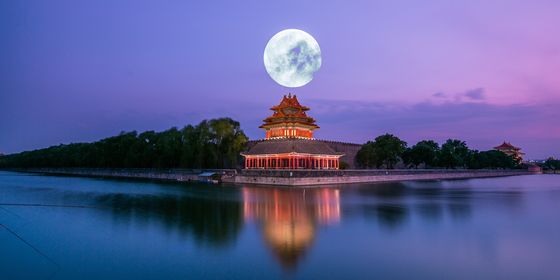From straddling bus to fake moon: Why is China so often credited with fantastical (and failed) tech innovations?
It was adored by the media as the ultimate solution for traffic congestion (Beijing residents spend an average of 1.3 hours on the road each day). Instead, the Transit Elevated Bus, a “straddling” bus that was supposed to glide on rails above heavy traffic, was shut down by the government after its first trial run, with CEO Bai Zhiming arrested for allegedly defrauding investors.
The pattern looks set to repeat with the “Chinese moonshot,” a project that literally promises to shoot a new moon into orbit to lighten up the streets of Chengdu. Already, the idea has lit up headlines around the world: Bloomberg exclaimed that “Fake Moon Over Chengdu Shows Why China is Billionaire Powerhouse,” while Astronomy magazine had to kill the buzz by explaining “Why China’s artificial moon probably won’t work.”
The “fake moon” would, in fact, be a satellite, covered in reflective coatings that reflect the sun’s rays and light up the Sichuanese capital at night with light that is eight times brighter than the (real) Moon. Wu Chunfeng, head of Tian Fu New Area Science Society in Chengdu, told China Daily that the project will help Chengdu save money by getting rid of street lamps (estimated to cost 174 million USD in electricity per year) and attract more tourism to a city best known for its pandas.
A few days after the “moon” was announced, China’s first private rocket mission ended in failure, reportedly at a cost of 14 million USD; the next launch will not be until 2020. This has prompted questions about the feasibility of a fake moon, also slated for 2020. According to Astronomy, a previous artificial moon tested out by Russia in 1994 only created a brief glimmer in the sky. Chengdu’s fake moon is supposed to be much brighter, orbiting just 300 miles above ground—but astronomers say satellites can only remain stationary at 22,000 miles above Earth, or more.
An alternative is to launch multiple satellites or keep one in place with rocket thrusters, but the cost of launching or constantly refueling these objects would cancel out any energy-saving benefits. An artificial moon is also unlikely to help with the problem of light pollution. Researchers have so far offered little other detail on the timeline, deliverables, or investment opportunities of the project.
It’s usual for China to get credited with one fantastical technological leap after another, from making robots to build other robots in Shanghai (which Swiss firm ABB plans to achieve by, yes, 2020) to a “smart highway” made of solar panels in Shandong’s Jinan (which will supposedly generate enough electricity for 800 homes). One Chinese company, which makes entire 3D-printed houses (for less than 5,000 USD!), has even offered to realize Trump’s dream wall at the US-Mexico border, claiming, “Donald Trump could build his wall much cheaper and in less than a year…maybe at around 60 per cent of the projected cost and three to four times faster.”
Yet it isn’t only foreign scientists raising eyebrows, but China’s own experts. Andy Xie, a Shanghai-based financial consultant, hypothesized to the South China Morning Post that China’s technology “bubble” is on the verge of collapse—a scenario that seems to ring true with founder Chinese tech stocks amid the escalating US-China trade war. Xie blames local governments, who pour money into homegrown tech businesses so they can boast their own so-called “unicorn” (a startup with a valuation of more than 1 billion USD).
While some brainwaves will doubtlessly face roadblocks, China’s other futuristic high-tech projects have seen widespread adoption: cashless payment via QR codes; police wearing facial recognition technology to find and track known criminals; Alipay’s social credit score; and a quantum-based space satellite launched by the Chinese Academy of Sciences.
Thus, even if the verdict is still out on the Chengdu’s moonshot, China is a definitely capable of surprising the world. As they say—shoot for the moon.











